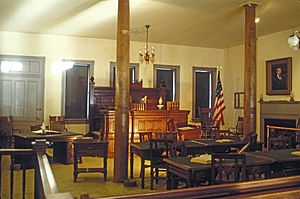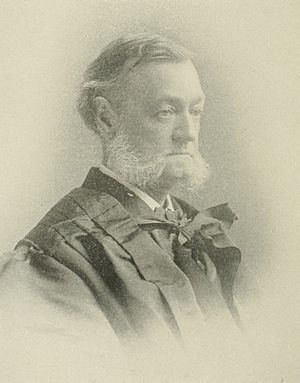Lucas v. United States facts for kids
Quick facts for kids Lucas v. United States |
|
|---|---|

|
|
| Argued November 19, 1895 Decided May 25, 1896 |
|
| Full case name | Lucas v. United States |
| Docket nos. | 692 |
| Citations | 163 U.S. 612 (more)
16 S. Ct. 1168; 41 L. Ed. 282
|
| Prior history | United States v. Lucas, (C.C.W.D. Ark.) |
| Holding | |
| Whether a Negro Freeman who was murdered was a member of the Choctaw Tribe is a question of fact for the jury, and his non-Indian status may not be presumed. | |
| Court membership | |
| Case opinions | |
| Majority | Shiras |
| Peckham took no part in the consideration or decision of the case. | |
| Laws applied | |
| 14 Stat. 769; 23 Stat. 362; 25 Stat. 786; 26 Stat. 81 | |
Lucas v. United States was an important case decided by the Supreme Court of the United States in 1896. The Court had to decide if a person's tribal membership was a fact that needed to be proven in court. They ruled that it could not just be assumed that someone was not a member of a tribe. Instead, it had to be shown with evidence. This case involved a man named Eli Lucas and the Choctaw Nation of Oklahoma.
Contents
Understanding the Case Background
The Choctaw Nation was one of the Five Civilized Tribes. These tribes lived in what was called the Indian Territory. This area is now the eastern part of Oklahoma.
Under their agreements with the United States, the Choctaw Nation had its own court system. These courts could handle crimes where both people involved were Native Americans. If a crime happened between a tribal member and someone who was not a tribal member, the case would go to a federal court. One such federal court was in Fort Smith, Arkansas.
Tribal members included "freedmen." These were African Americans who had been slaves. After the American Civil War, many of them were adopted into the Choctaw tribe.
The Crime and Trial
In 1894, a man named Eli Lucas was accused of murder. Lucas was a member of the Choctaw Nation. He was accused of killing Levy Kemp, who was an African American.
The trial took place in 1895. It was held in Judge Isaac Parker's court. Witnesses said that Lucas had followed Kemp after a ball game. They claimed Lucas then killed him.
Lucas's defense team argued that he was not telling the truth when he said he killed Kemp. They suggested someone else might have done it. Despite their arguments, Lucas was found guilty of murder. He was sentenced to hang.
The Appeal to the Supreme Court
Lucas's lawyers did not give up. They decided to appeal the case. An appeal means asking a higher court to review the decision of a lower court. The Supreme Court of the United States agreed to hear Lucas's case.
The Supreme Court's Decision
Justice George Shiras, Jr. wrote the main opinion for the Supreme Court. The Court looked at the details of the trial.
The Court agreed that Levy Kemp was not a Choctaw Freedman. This meant he was not a member of the Choctaw tribe. However, the Court found that Judge Parker had made a mistake during the trial.
Proving Tribal Membership
The Supreme Court said that the trial court should not have just assumed Kemp was not a tribal member. The government needed to prove this fact. Proving it was important for the court to have jurisdiction. Jurisdiction means the legal power or authority a court has to hear a case.
Justice Shiras pointed out that federal courts did not have jurisdiction over crimes between Native Americans if the tribe had its own court. This was based on existing laws.
What is Hearsay?
The Court also ruled on another important point. During the trial, a witness named John LeFlore had testified about what Kemp told him. The Supreme Court said this was hearsay. Hearsay is when someone tells you what another person said, instead of that person saying it themselves. Generally, hearsay is not allowed as evidence in court.
The Outcome
Because of these mistakes, the Supreme Court decided that Lucas's conviction was wrong. They ordered that Lucas get a new trial. He was then released to the Choctaw Nation. The Choctaw Nation would handle his new trial in their own court system.
 | Sharif Bey |
 | Hale Woodruff |
 | Richmond Barthé |
 | Purvis Young |



